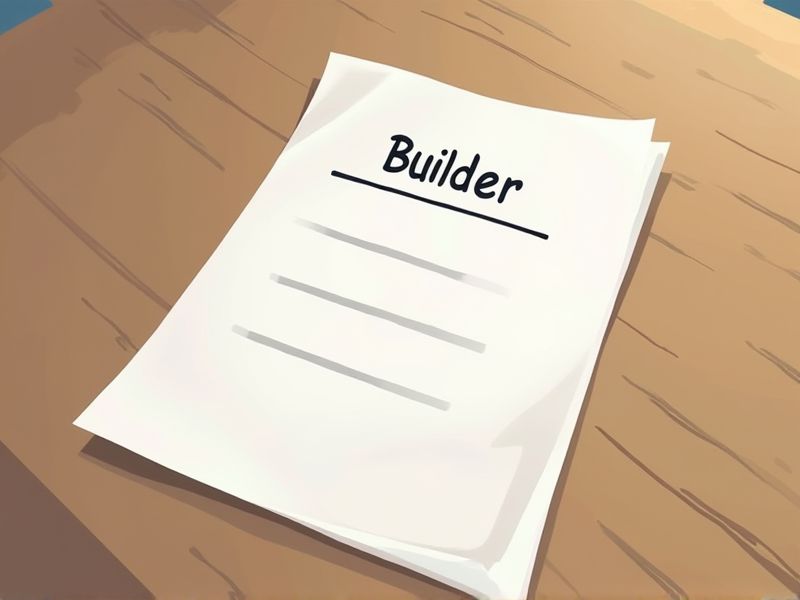
Builders often require specific certifications to ensure they meet industry standards and safety regulations. Certifications validate a builder's skills and knowledge, promoting customer confidence and reducing liability risks. They also facilitate compliance with local building codes, preventing costly penalties or project delays. Here are essential certifications you might need as a builder.
Certified Construction Manager (CCM)
Having a Certified Construction Manager (CCM) on a project increases the likelihood of successful project outcomes by ensuring effective coordination and communication among stakeholders. Builders benefit from a CCM's expertise in managing time, cost, and quality, which mitigates the risk of project delays and budget overruns. The CCM's training in safety and regulatory compliance helps builders avoid legal issues and maintain a safe work environment. Hiring a CCM often enhances the overall project credibility and marketability, leading to increased client trust and business opportunities.
Associate Constructor (AC)
The Associate Constructor (AC) designation ensures that individuals in the construction field possess a strong foundational knowledge, which leads to improved project outcomes. When companies hire ACs, they experience increased efficiency due to the standardized skills and competencies AC-holders bring to the team. This, in turn, reduces errors and rework, saving both time and resources. Employers also find that AC-certified professionals enhance workplace safety, as they are trained in industry best practices and safety protocols.
Certified Professional Constructor (CPC)
Becoming a Certified Professional Constructor often leads to an increase in trust and credibility, as clients and employers recognize the builder's commitment to industry standards. CPC certification enhances a builder's skill set and knowledge, often resulting in improved project management and construction quality. The certification process provides builders with updated industry practices and safety protocols, reducing the likelihood of project delays or costly errors. Achieving CPC status typically results in broader career opportunities and potential salary increases due to the recognized proficiency within the field.
OSHA 30-Hour Construction Certification
The OSHA 30-Hour Construction Certification equips builders with comprehensive knowledge of workplace safety standards, reducing the likelihood of accidents on site. Enhanced safety awareness from this certification can result in fewer work-related injuries, which directly lowers costs associated with medical claims and project downtime. Builders with this certification often comply more effectively with federal safety regulations, minimizing the risk of legal penalties. The certification also improves a builder's professional credibility, fostering trust among clients and fellow contractors.
OSHA 10-Hour Construction Certification
Builders need the OSHA 10-Hour Construction Certification because it provides essential safety training, helping to reduce workplace accidents. The certification ensures compliance with federal regulations, which can prevent costly fines and legal issues for construction companies. Knowledge gained from the course enhances hazard recognition, resulting in a safer work environment. Holding this certification can also improve employability, as many employers prefer candidates with proven safety training.
LEED Green Associate
The demand for sustainable construction practices has increased, prompting builders to seek LEED Green Associate accreditation for credibility in executing eco-friendly projects. Builders equipped with this certification typically demonstrate a commitment to reducing environmental footprints, which appeals to environmentally conscious clients. The LEED credential helps builders stay updated with the latest advancements in green-building technologies. Clients often prefer working with LEED-accredited professionals as it can lead to potential energy savings and improved building efficiencies.
Building Information Modeling (BIM) Certification
Building Information Modeling (BIM) Certification ensures builders are equipped with the standardized skills necessary for efficient project management and execution. Certified builders demonstrate competence, which can lead to increased trust and credibility with clients and stakeholders. Accurate modeling and data management facilitated by BIM certification reduce construction errors and project delays. As the industry increasingly adopts digital solutions, certified builders are more competitive in securing sophisticated projects requiring modern technological expertise.
Certified Building Inspector (CBI)
Builders rely on Certified Building Inspectors (CBIs) to ensure compliance with local building codes, which reduces the risk of costly legal issues. CBIs help identify structural issues early in the construction process, preventing future repairs and enhancing long-term safety. Accurate assessments from CBIs can also expedite project timelines by minimizing approval delays. Their expertise provides builders with confidence, ensuring projects meet quality standards dictated by regulations.
Project Management Professional (PMP)
Project Management Professional (PMP) certification equips builders with standardized project management methodologies, leading to more efficient execution of construction projects. This certification enhances credibility and trust with clients, often resulting in more job opportunities and higher earning potential. PMP certification enables builders to better manage project timelines, resources, and risk, reducing delays and cost overruns. By aligning with industry best practices, PMP-certified builders can ensure successful project outcomes and maintain competitive advantage.
NICET Certification
NICET Certification ensures that builders have a standardized level of competence, directly affecting the quality and safety of construction projects. It encourages continuous professional development, keeping builders updated with current industry practices, which leads to more efficient project execution. The certification enhances credibility, often becoming a deciding factor for clients when choosing professionals for their projects. It reduces risks and liabilities, as certified builders are more likely to follow stringent safety standards and regulations.
Summary
As someone considering hiring a builder, you can expect higher trust and confidence when they have relevant certifications. Certified builders are likely to have demonstrated industry standards, thus ensuring a higher quality of work. This often leads to reduced risk of construction errors and subsequent project delays. Your investment in a certified builder can result in long-term satisfaction and fewer maintenance needs.
